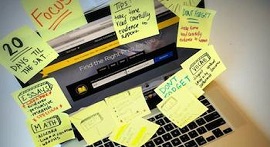Washington University has a reputation as a premier university — one that enables students to create their own real-world success. At WashU, we know discovery starts with big aspirations and progress comes from passionate persistence. Together with our peers, professors, and alumni, we set out to change the world. We love a good challenge—one that pushes us outside our comfort zone and lets each one of us shine in our own unique way.
Washington University's mission is to discover and disseminate knowledge, and protect the freedom of inquiry through research, teaching, and learning. WashU offers a supportive, and intellectually rigorous environment where students of all identities and backgrounds thrive. Whether you're exploring outside the classroom, participating in one of our 450+ student-led clubs & organizations, conducting hands-on research with our world-renowned faculty, or landing an internship that propels you down your eventual career path: WashU is here to support our students. Our faculty and staff strive to enhance the lives and livelihoods of students, the people of the greater St. Louis community, the country, and the world. Central to our mission are our goals, which are to welcome students, faculty, and staff from all backgrounds to create an inclusive community that is welcoming, nurturing, and intellectually rigorous; to foster excellence in our teaching, research, scholarship, and service; to prepare students with attitudes, skills, and habits of lifelong learning and leadership thereby enabling them to be productive members of a global society; and to be an institution that excels by its accomplishments in our home community, St. Louis, as well as in the nation and the world. Through our goals, Washington University intends to judge itself by the most exacting standards; to attract people of great ability from diverse backgrounds; to encourage faculty and students to be bold, independent, and creative thinkers; to provide an exemplary, respectful, and responsive environment for living, teaching, learning, and working for present and future generations; and to focus on meaningful measurable results for all of our endeavors.
About
From the School
Contact & Visit
Campus Visits Contact
MSC 1089-105-05, One Brookings Drive
St. Louis, MO 63130-4899
Experience College Life
Olin Library
Danforth University Center
Brookings Quadrangle
South 40 Residential Area
Delmar Loop
Gateway Arch
Cardinals, Blues, and St. Louis City Soccer Sporting Events
Fox Theatre
Campus Tours
8:30am-5pm and 8:30am-1:30pm
(800) 638-0700
Dates: Year-round
Times: Varies
Average Length: 1 hour
On Campus Interview
Faculty and Coach Visits
Overnight Dorm Stays
Transportation
Admissions
Admissions
Overall
From The School
We want to know each student by name and story and help then direct their talents, drive, and energy toward becoming successful, contributing global citizens who work to improve our community and the world. With this in mind, we review each application in a holistic and individual manner.
Students who come to WashU have challenged themselves in their academics and extracurricular activities during their high school years. We are looking for students with a high school diploma or equivalent who took a challenging college-preparatory curriculum in high school complemented by extracurricular activities, community service, and work experience. Your senior-year transcript should show that you continue to take demanding courses. Most applicants take advantage of honors, advanced placement, and International Baccalaureate courses, if offered by their high schools.
Students may apply to WashU using either the Common Application or Coalition Application.
First-year and transfer applicants to the College of Art are required to submit a portfolio of their work. Portfolios are also encouraged for students applying to the College of Architecture. Interview and videos are optional and not required as part of the admissions application process. We offer these opportunities as a way for first-year applicants to tell us more about themselves.
The $75 nonrefundable application fee is required to complete your application. You may pay the application fee using a credit card when you submit either the Common Application or Coalition Application. As part of Washington University's commitment to meeting 100 percent of demonstrated financial need for all admitted students, we are happy to waive our $75 application fee when it presents a financial hardship. Please see our website for details.
We offer first-year applicants a choice of three decision plans – Early Decision I, Early Decision II, and Regular Decision. If WashU is clearly your first-choice school, we encourage you to apply under the Early Decision option. Early Decision I and Early Decision II candidates receive admission and financial aid decisions earlier than regular decision candidates. WashU will meet 100% of the demonstrated financial need for all admitted students, regardless of your chosen decision plan. The academic scholarship process is separate – scholarship decisions are not made until well after the Early Decision notification dates. Your Early Decision application is a binding commitment that you will attend WashU if admitted. Early Decision candidates and their counselors and a parent or guardian must sign the Early Decision commitment statement on the application.
WashU is a proud QuestBridge campus partner. We believe that all talented students should have access to higher education regardless of their financial background—which is why we've partnered with QuestBridge, a leading nonprofit that connects high-achieving, low-income students to the nation's best colleges. Please visit the QuestBridge website for eligibility requirements.
Overview
GPA Breakdown
Need to boost your grades? We can help.
Learn MoreSAT & ACT Test Scores
Testing Policies
Deadlines
Early Decision — November 1
Early Decision II — January 2
Regular — January 2
Other Admission Factors
Rigor of Secondary School Record
Class Rank
Academic GPA
Standardized Test Scores
Application Essay
Recommendation(s)
Talent / Ability
Character / Personal Qualities
Selectivity Rating
Get a personalized plan for a competitive application from an admissions expert.
Learn MoreAcademics
Academics
Overall
From The School
Academic Programs
Special Programs
The Beyond Boundaries Program helps talented, self-initiated, and self-motivated students become creative problem solvers and insightful scholars who are prepared to pursue their own broad interdisciplinary interests. This unique educational experience requires collaboration across academic disciplines and perspectives, drawing on the strength and interconnectedness of the university's seven schools.
The Bachelor of Science in Business and Computer Science is an integrated joint degree program offered through the Olin Business School and the McKelvey School of Engineering. Students in this program will be equipped with the fundamental knowledge and perspectives of computer science and business and will have unique opportunities to converge these two disciplines. This is a distinctive degree program that captures the intersection of business and computer science and the growing demand for people with this special and sought-after skillset.
Research
Over 50% of undergraduate students participate in research alongside faculty who are leaders in their field. Twice a year, the Office of Undergraduate Research presents the Undergraduate Research Symposium. This is a forum for students to present their research findings and a celebration of the diversity of research that takes place at WashU.
Study Abroad
You are encouraged to infuse global experiences into all aspects of your education, and about 40% of WashU undergraduates in all divisions learn through study abroad opportunities and internships in more than 50 countries each year.
Majors and Degrees Offered
WashUs undergraduate program comprises five undergraduate schools: The College of Arts & Sciences, Olin Business School, McKelvey School of Engineering, and the Sam Fox School of Design & Visual Arts (College of Art and College of Architecture)
WashU offers 100+ fields of study, a variety of academic programs, and 200+ courses. About 80% of students will pursue multiple majors and/or minors or simply take classes in subjects that interest them, embracing interdisciplinary learning.
The student-to-faculty ratio is 7:1. Whether you choose a traditional path or pursue your interests across disciplines, the faculty will inspire your intellectual, personal, and professional growth during your time at WashU and beyond.
Faculty and Class Information
Graduation Rates
Majors
-
ARCHITECTURE AND RELATED SERVICES.
Architectural and Building Sciences/Technology.
Architectural Technology/Technician.
Architecture.
-
AREA, ETHNIC, CULTURAL, GENDER, AND GROUP STUDIES.
African-American/Black Studies.
American/United States Studies/Civilization.
Area Studies, Other.
East Asian Studies.
Ethnic, Cultural Minority, Gender, and Group Studies, Other.
Latin American Studies.
Near and Middle Eastern Studies.
Women's Studies.
-
BIOLOGICAL AND BIOMEDICAL SCIENCES.
Biochemistry, Biophysics and Molecular Biology, Other.
Biochemistry.
Biological and Biomedical Sciences, Other.
Biology, General.
Biology/Biological Sciences, General.
Biomathematics, Bioinformatics, and Computational Biology, Other.
Biophysics.
Ecology.
Environmental Biology.
Microbiology, General.
Neuroscience.
-
BUSINESS, MANAGEMENT, MARKETING, AND RELATED SUPPORT SERVICES.
Accounting.
Business Administration and Management, General.
Business Administration, Management and Operations, Other.
Business/Managerial Economics.
Entrepreneurship/Entrepreneurial Studies.
Finance, General.
Human Resources Management/Personnel Administration, General.
Logistics, Materials, and Supply Chain Management.
Marketing/Marketing Management, General.
Operations Management and Supervision.
-
COMMUNICATION, JOURNALISM, AND RELATED PROGRAMS.
Communication, Journalism, and Related Programs, Other.
Journalism.
Public Relations, Advertising, and Applied Communication.
-
COMPUTER AND INFORMATION SCIENCES AND SUPPORT SERVICES.
Computer and Information Sciences, General.
Computer Programming/Programmer, General.
Computer Science.
Computer Systems Analysis/Analyst.
Information Technology.
-
EDUCATION.
Art Teacher Education.
Biology Teacher Education.
Chemistry Teacher Education.
Drama and Dance Teacher Education.
Education, General.
Education, Other.
Elementary Education and Teaching.
English/Language Arts Teacher Education.
French Language Teacher Education.
German Language Teacher Education.
History Teacher Education.
Junior High/Intermediate/Middle School Education and Teaching.
Mathematics Teacher Education.
Physics Teacher Education.
Science Teacher Education/General Science Teacher Education.
Secondary Education and Teaching.
Social Science Teacher Education.
Social Studies Teacher Education.
Spanish Language Teacher Education.
Teacher Education and Professional Development, Specific Levels and Methods, Other.
-
ENGINEERING.
Bioengineering and Biomedical Engineering.
Chemical Engineering.
Computer Engineering, General.
Electrical and Electronics Engineering
Engineering, General.
Engineering, Other.
Environmental/Environmental Health Engineering.
Mechanical Engineering.
Systems Engineering.
-
ENGLISH LANGUAGE AND LITERATURE/LETTERS.
Creative Writing.
English Language and Literature, General.
English Language and Literature/Letters, Other.
-
FOREIGN LANGUAGES, LITERATURES, AND LINGUISTICS.
Arabic Language and Literature.
Chinese Language and Literature.
Classics and Classical Languages, Literatures, and Linguistics, General.
Classics and Classical Languages, Literatures, and Linguistics.
Comparative Literature.
French Language and Literature.
Germanic Languages, Literatures, and Linguistics, General.
Germanic Languages, Literatures, and Linguistics.
Italian Language and Literature.
Japanese Language and Literature.
Korean Language and Literature.
Linguistics.
Romance Languages, Literatures, and Linguistics, General.
Romance Languages, Literatures, and Linguistics.
Spanish Language and Literature.
-
HEALTH PROFESSIONS AND RELATED PROGRAMS.
Health Professions and Related Clinical Sciences, Other.
Health Services/Allied Health/Health Sciences, General.
Health/Health Care Administration/Management.
Health/Medical Preparatory Programs, Other.
Medicine.
Pre-Dentistry Studies.
Pre-Medicine/Pre-Medical Studies.
Pre-Pharmacy Studies.
-
HISTORY.
History, General.
-
LIBERAL ARTS AND SCIENCES, GENERAL STUDIES AND HUMANITIES.
Humanities/Humanistic Studies.
Liberal Arts and Sciences, General Studies and Humanities, Other.
Liberal Arts and Sciences/Liberal Studies.
-
MATHEMATICS AND STATISTICS.
Applied Mathematics, General.
Mathematics, General.
Mathematics, Other.
Statistics, General.
-
MULTI/INTERDISCIPLINARY STUDIES.
Ancient Studies/Civilization.
Biological and Physical Sciences.
Biopsychology.
Cognitive Science.
International/Global Studies.
Mathematics and Computer Science.
Multi-/Interdisciplinary Studies, Other.
Science, Technology and Society.
Sustainability Studies.
Systems Science and Theory.
-
NATURAL RESOURCES AND CONSERVATION.
Environmental Science.
Environmental Studies.
Natural Resources Management and Policy.
-
PHILOSOPHY AND RELIGIOUS STUDIES.
Philosophy and Religious Studies, Other.
Philosophy, Other.
Philosophy.
Religion/Religious Studies.
-
PHYSICAL SCIENCES.
Astrophysics.
Chemistry, General.
Chemistry, Other.
Geochemistry.
Geological and Earth Sciences/Geosciences, Other.
Geology/Earth Science, General.
Geophysics and Seismology.
Physical Sciences.
Physics, General.
-
PSYCHOLOGY.
Cognitive Psychology and Psycholinguistics.
Experimental Psychology.
Industrial and Organizational Psychology.
Psychology, General.
-
SOCIAL SCIENCES.
Anthropology.
Archeology.
Econometrics and Quantitative Economics.
Economics, General.
International Relations and Affairs.
Medical Anthropology.
Political Science and Government, General.
Social Sciences, General.
Sociology.
Urban Studies/Affairs.
-
VISUAL AND PERFORMING ARTS.
Art History, Criticism and Conservation.
Ceramic Arts and Ceramics.
Cinematography and Film/Video Production.
Dance, General.
Design and Visual Communications, General.
Drama and Dramatics/Theatre Arts, General.
Fashion/Apparel Design.
Film/Cinema/Video Studies.
Film/Video and Photographic Arts, Other.
Fine Arts and Art Studies, Other.
Fine/Studio Arts, General.
Graphic Design.
Illustration.
Intermedia/Multimedia.
Music, General.
Painting.
Photography.
Printmaking.
Sculpture.
Students Say
A 7:1 student-to-faculty ratio provides incredible support across 100 fields of study and nearly 2,000 "very rigorous and challenging" classes, including "some really interesting and unique courses that provide great opportunities for students to explore their interests experientially." Professors "are so dedicated and truly invested in learning," and the school "has the best resources out there." Students remark that advisors and instructors are there for students and are "always willing to help." People appreciate that "there are a ton of projects built into...classes"; for example, business courses "include a component where we get to work with a real company/non-profit on a project related to the course material." Many classes are also discussion-based or involve interactive and flipped classrooms where students watch the lecture videos before class and apply the concepts during class.
Degrees
Bachelor's
Certificate
Doctoral
Doctoral/Professional
Doctoral/Research
Master's
Post-Bachelor's certificate
Post-Master's certificate
Career Services
Alumni Network
Alumni Services
Classes
Interest Inventory
Internships
Regional Alumni
Coop
Experiential
Internship
Prominent Alumni
Academic Rating
Careers
Careers
Graduation Rates
Career Services
Alumni Network
Alumni Services
Classes
Interest Inventory
Internships
Regional Alumni
Coop
Experiential
Internship
ROI & Outcomes
Students Say
Excerpt from Colleges That Create Futures
Tuition & Aid
Tuition & Aid
Overview
From The School
Tuition, Room, Board and Fees
- Tuition: $57,750
- Average Room & Board: $17,900
- Student activity fee: $578
- Student health and wellness fee: $538
Financial Aid
Cost will not be a barrier
WashU will not let cost be a barrier to your education. Through the Gateway to Success initiative, we have a need-blind admissions policy for all first-year applicants who are U.S. citizens or permanent residents. This means we won't factor your ability to pay in the admission decision process.
Through an individualized experience with one of our Student Financial Services counselors, we meet 100% of demonstrated need so you can be 100% focused on chasing your dreams and realizing your ambitions.
WashU supports several initiatives that provide students the resources they need to engage fully in academic and campus life including a no-loan policy for families who earn $75,000 or less, with scholarships and grants that offset initial college costs and the WashU Pledge, an initiative announced in 2019, provides a free WashU education for full-time undergraduate students residing in or attending high school in Missouri and select counties in southern Illinois.
Merit-based academic scholarships
Washington University is committed to supporting talented students from all cultural and socioeconomic backgrounds, and with all academic interests. Our merit-based academic scholarships offer financial assistance based primarily on academic achievement.
Each undergraduate division at Washington University provides a number of four-year scholarships that range up to the full cost of tuition. First-year students are selected as finalists for these academic scholarships based on a review of their admissions application. These scholarships do not require a separate application process. If you wish to apply to one (or all) of our Signature Scholar Programs – Danforth, Ervin, and Rodriguez – first start your application via the Common or Coalition Application. The optional Writing Supplement serves as our application for our Signature Scholar Programs.
Dates
Required Forms
Forms CSSProfile
Forms Divorced Parent
Financial Aid Statistics
Expenses per Academic Year
Available Aid
Need-Based College/University Scholarship or Grant Aid from Institutional Funds
Need-Based Federal Pell
Need-Based Private Scholarships
Need-Based SEOG
Need-Based State Scholarships
Direct Subsidized Stafford Loans
Direct Unsubsidized Stafford Loans
State Loans
Financial Aid Rating
Student Body
Student Body
Overall
From The School
WashU students are driven and ambitious but also collaborative. You'll find that your peers will cheer you on, encouraging your success and also pushing you to leave your comfort zone, both inside and outside of the classroom.
You can join one of WashUs 450+ clubs and organizations, travel and learn through study abroad programs, and have the opportunity to participate in cutting-edge research alongside professors who are leaders in their fields.
The Gephardt Institute for Civic and Community Engagement cultivates informed and actively engaged citizens. Community service is a natural part of life at WashU, with approximately 60% of students engaging in a wide range of service projects.
Student Body Profile
Demographics
Students Say
Campus Life
Campus Life
Overview
From The School
Location
Washington University offers a nurturing, yet intellectually rigorous, environment where students from all identities and backgrounds thrive. On campus and across the world, you will find talented, inspiring WashU students and faculty developing big ideas and pushing the boundaries on what it means to learn.
Campus Facilities & Equipment
Located in the heart of St. Louis, WashUs 169 acres are comprised of top-of-the-line buildings, laboratories, classrooms, and libraries—all of which foster a sense of community, creativity, and collaboration.
Your first WashU home will be located on the South 40—a vibrant residential community on campus, complete with residential colleges, great food, fitness facilities, study areas, and student-run businesses. Our nationally-ranked dining program offers diverse cuisines from around the world.
Off-Campus Opportunities
St. Louis offers the ideal balance of small-town feel and big city opportunities. You'll have endless options when it comes to dining, entertainment, sports, cultural attractions, shopping, and more—not to mention internships at top nonprofit organizations and Fortune 500 companies.
Campus Life
Housing Options
Apartment Single
Disabled Student
Dorms Coed
International Student
Other
Theme Housing
Students Say
Special Needs Admissions
Documentation Required for LD
Current Disability Resources Documentation Guidelines may be found here: https://disability.wustl.eduDocumentation Required for ADHD
Current Disability Resources Documentation Guidelines may be found here: https://disability.wustl.eduSpecial Need Services Offered
Student Activities
Sports
Basketball
Cross Country
Diving
Football
Soccer
Swimming
Tennis
Track Field Indoor
Track Field Outdoor
Cross Country
Diving
Golf
Soccer
Softball
Swimming
Tennis
Track Field Indoor
Track Field Outdoor
Volleyball
Student Services
LGBT Support Groups
Army ROTC Offered on-campus
Air Force ROTC Offered at cooperating institutions: St. Louis University
Sustainability
Data provided by Association for the Advancement of Sustainability in Higher Education (AASHE), STARS®, as of March, 2024.
Campus Security Report
The Jeanne Clery Act requires colleges and universities to disclose their security policies, keep a public crime log, publish an annual crime report and provide timely warnings to students and campus employees about a crime posing an immediate or ongoing threat to students and campus employees.
Please visit The Princeton Review’s page on campus safety for additional resources: http://www.princetonreview.com/safety
The Princeton Review publishes links directly to each school's Campus Security Reports where available. Applicants can also access all school-specific campus safety information using the Campus Safety and Security Data Analysis Cutting Tool provided by the Office of Postsecondary Education of the U.S. Department of Education: https://ope.ed.gov/campussafety/#/
Other Information
Wellness Program/Clinical Offerings
Education & Training
Available for faculty & staff;
Available for faculty & staff;



















